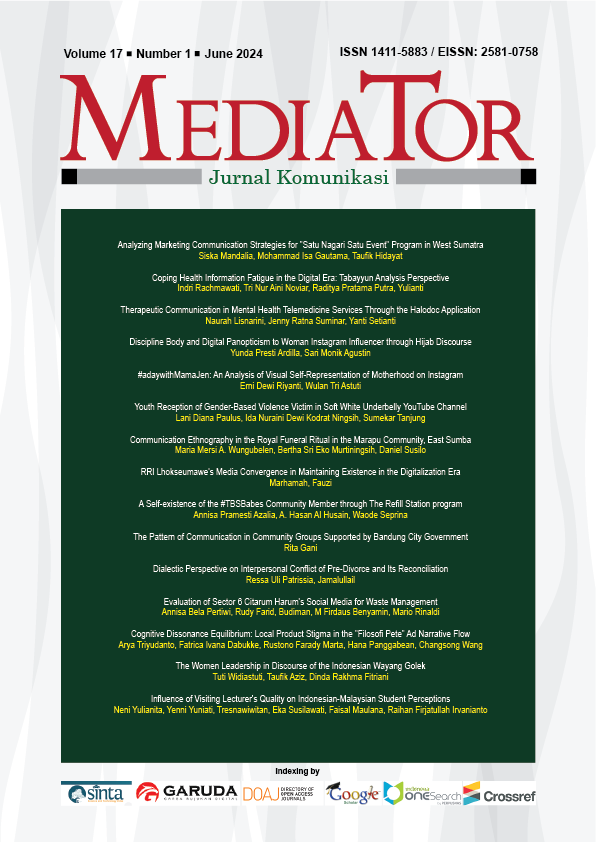Influence of Visiting Lecturer's Quality on Indonesian-Malaysian Student Perceptions
DOI:
https://doi.org/10.29313/mediator.v17i1.2969Keywords:
teaching quality, visiting lecturer, perception, collaboration programAbstract
This article highlights the importance of a lecturer's success when providing a learning process to their students. For this reason, the study of the success of the learning process needs to be researched by looking at the influence of learning quality on student perceptions. The Faculty of Communication Sciences of Universitas Islam Bandung (UNISBA) has conducted a series of Online Visiting Lecturers in collaboration with the Faculty of Leadership and Management (FKP), Universiti Sains Islam Malaysia (USIM). The study opted comparative quantitative research approach to investigate the influence of teaching quality on Indonesian-Malaysian Students’ Persception among the students who have participated in the visiting lecturer program. Based on the results of the calculation of R-square and R-value, the teaching quality positive influences the perception of Indonesian student by 54,3% and that of Malaysian student by 73.7%. It demonstrated that the teaching quality of the visiting lecturer program positively influences the perceptions of Indonesian-Malaysian students.
References
Berliner, D. C. (2005). The near impossibility of testing for teacher quality. Journal of Teacher Education, 56(3), 205–213. https://doi.org/10.1177/0022487105275904
Cheon, S. H., & Reeve, J. (2015). A classroom-based intervention to help teachers decrease students’ amotivation. Contemporary Educational Psychology, 40, 99–111. https://doi.org/10.1016/J.CEDPSYCH.2014.06.004
Hattie, J., & Timperley, H. (2007). The power of feedback. In Review of Educational Research (Vol. 77, Issue 1, pp. 81–112). SAGE Publications Inc. https://doi.org/10.3102/003465430298487
Hodges, T. E., & Baum, A. C. (2019). Quality Teaching : Handbook of Reseach on Feld–Based Teacher Education. IGI Global.
Hospel, V., & Galand, B. (2016). Are both classroom autonomy support and structure equally important for students’ engagement? A multilevel analysis. Learning and Instruction, 41, 1–10.
Kalyanasundaram, P., & Madhavi, C. (2020). Article ID: IJM_11_03_010 Online Value Added Courses. International Journal of Management (IJM), 11(3), 89–96. http://www.iaeme.com/IJM/index.asp89http://www.iaeme.com/ijm/issues.asp?JType=IJM&VType=11&IType=3JournalImpactFactor
Kusurkar, R., Croiset, G., & Cate, TH. J. Ten. (2011). Twelve tips to stimulate intrinsic motivation in students through autonomy-supportive classroom teaching derived from self-determination theory. Med Teach, 33(12).
León, J., Medina-Garrido, E., & Ortega, M. (2018). Teaching quality: High school students’ autonomy and competence. Psicothema, 30(2), 218–223.
Mcleod, S. (2023, June 16). Visual Perception Theory In Psychology. SimplyPsychology.
Okoye, N. S., Momoh, S. O., Aigbomian, D. O. A., & Okecha, R. E. (2008). Teachers’ quality, instructional strategies and students’ performance in secondary school science. Journal of Instructional Psychology, 35(2).
Patoka, J. (2022, September 28). Visiting Lecturer Series 01 dengan doc. Ing. Jiří Patoka, Ph.D., DiS. Program Studi Agribisnis, Fakultas Sains Dan Teknologi, Universitas Terbuka (FST-UT).
Reeve, J. (2006). Teachers as Facilitators: What Autonomy-Supportive Teachers do and why their Students Benefit. The Elementary School Journal, 106(3), 225–236.
Sanjaya, W. (2015). Penelitian Pendidikan. Prenada Media Group.
Sekaran, U., & Bougie, R. (2010). Research Methods for Business: A Skill Business Approach. John Wiley & Sons.
Stroet, K., Opdenakker, M. C., & Minnaert, A. (2013). Effects of need supportive teaching on early adolescents’ motivation and engagement: A review of the literature. Educational Research Review, 9, 65–87. https://doi.org/10.1016/J.EDUREV.2012.11.003
Sumanto. (2014). Psikologi umum : untuk mahasiswa, dosen, dan Masyarakat umum. CAPS (Senter of Academic Publishing servis).
Tessier, D., Sarrazin, P. G., & Ntoumanis, N. (2010). The Effect of an Intervention to Improve Newly Qualified Teachers’ Interpersonal Style, Students Motivation and Psychological Need Satisfaction in Sport-Based Physical Education. Contemporary Educational Psychology, 35(4), 242–253.
Thurlings, M., Vermeulen, M., Bastiaens, T., & Stijnen, S. (2013). Understanding feedback: A learning theory perspective. In Educational Research Review (Vol. 9, pp. 1–15). https://doi.org/10.1016/j.edurev.2012.11.004
Torff, B. (2005, December). Getting it wrong on threats to teacher quality. Kappan.
Vansteenkiste, M., Sierens, E., Goossens, L., Soenens, B., Dochy, F., Mouratidis, A., Aelterman, N., Haerens, L., & Beyers, W. (2012). Identifying configurations of perceived teacher autonomy support and structure: Associations with self-regulated learning, motivation and problem behavior. Learning and Instruction, 22(6), 431–439.
Vitoria, L., Mislinawati, M., & Nurmasyitah, N. (2018). Students’ perceptions on the implementation of e-learning: Helpful or unhelpful? Journal of Physics: Conference Series, 1088. https://doi.org/10.1088/1742-6596/1088/1/012058
Downloads
Published
Issue
Section
License
Copyright (c) 2024 Neni Yulianita, Yenni Yuniati, Tresnawiwitan, Eka Susilawati, Faisal Maulana, Raihan Firjatullah Irvanianto

This work is licensed under a Creative Commons Attribution-ShareAlike 4.0 International License.























